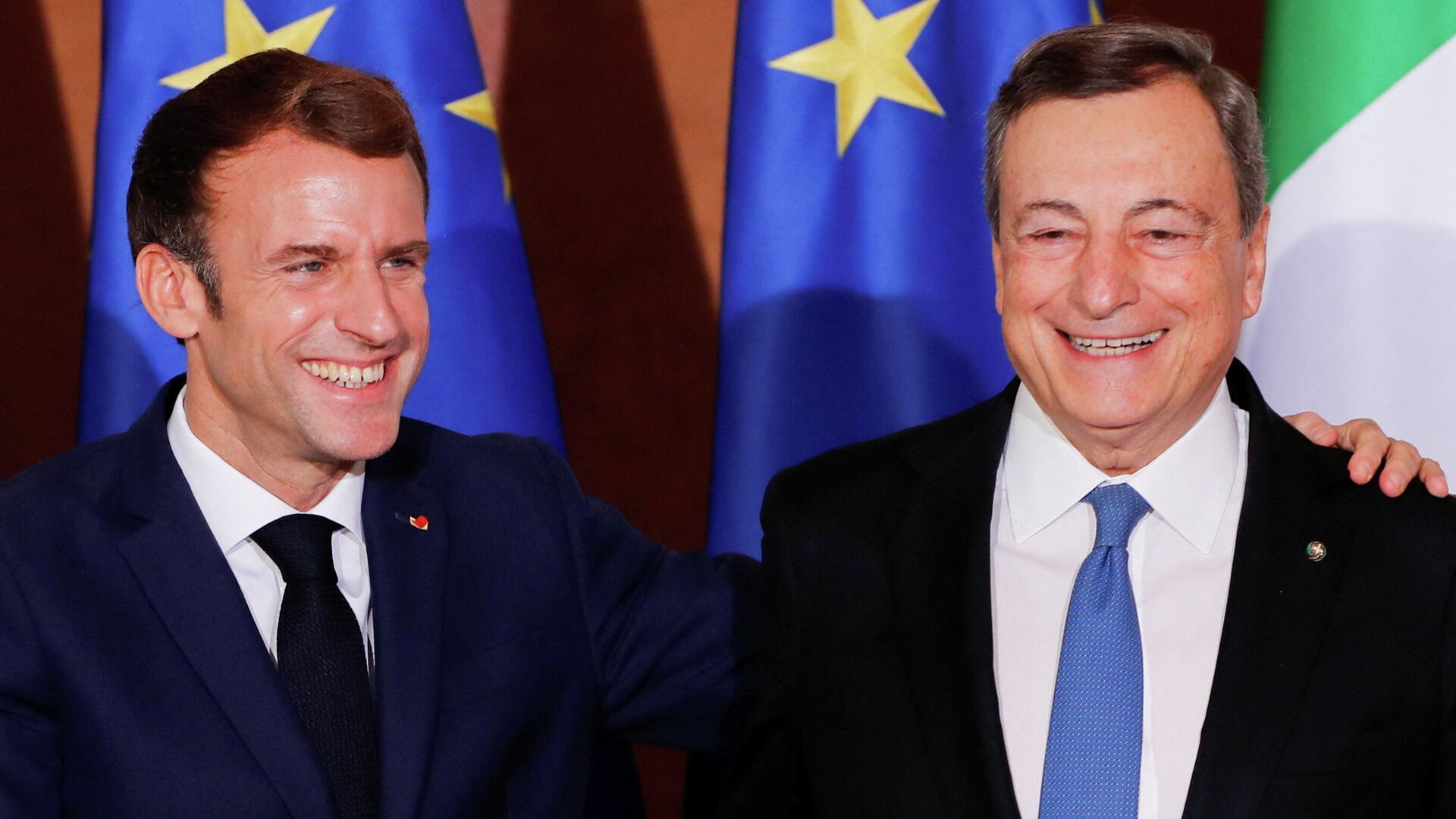https://sputnikglobe.com/20211223/frances-macron-italys-draghi-call-for-fiscal-reforms-in-the-eu-on-path-to-covid-recovery-1091755310.html
France's Macron, Italy's Draghi Call for Fiscal Reforms in the EU on Path to COVID Recovery
France's Macron, Italy's Draghi Call for Fiscal Reforms in the EU on Path to COVID Recovery
Sputnik International
The proposals from France and Italy come as Europe struggles to curb the spread of a novel coronavirus strain dubbed Omicron, which has already prompted additional restrictions in several countries.
2021-12-23T16:09+0000
2021-12-23T16:09+0000
2023-04-12T17:14+0000
europe
france
mario draghi
emmanuel macron
economy
italy
european union (eu)
https://cdn1.img.sputnikglobe.com/img/07e5/0c/17/1091755605_0:0:2743:1543_1920x0_80_0_0_68b19bd8089b565fa0a75929f854dede.jpg
The European Union needs to reform its fiscal rules to boost investments that will help the bloc to recover from COVID-19, become more sustainable and protect its sovereignty, French President Emmanuel Macron and Italy's Prime Minister Mario Draghi said in a joint op-ed for the Financial Times.Macron and Draghi acknowledged that "we must bring down our levels of indebtedness", but said it cannot be done through higher taxes or unsustainable cuts in social spending.The op-ed points to the experience of the two years of the coronavirus pandemic, which, in the view of the two leaders, showed the advantages of stepping away from the EU fiscal rules in favour of "bold actions" such as the European Central Bank unleashing a sizeable monetary stimulus to support lending.Instead of sticking to the EU fiscal rules that they view as over-complicated and obsolete, Macron and Draghi call for a curb to recurrent public spending through "sensible" structural reforms.Both French and Italian leaders called for a discussion of new proposals which would not be "clouded by ideology".The European Union's budget rules envisage strict limitations on government deficits and debts to shield the euro from devaluation. Since the rules were introduced in 1992 under the Maastricht Treaty, the members were required to keep public debt below 60 percent and the public deficit below 3 percent of GDP.The debates around the complex fiscal rules have been raging for a long time, with different proposals to amend them emerging within the bloc. In particular, some suggestions pointed at the example of some non-euro area countries such as the UK and Sweden that have softer fiscal rules, and introduce looser “fiscal standards” that would be enforced by an apolitical body. Other offers include making the practices implemented during the coronavirus pandemic permanent.
france
italy
Sputnik International
feedback@sputniknews.com
+74956456601
MIA „Rossiya Segodnya“
2021
News
en_EN
Sputnik International
feedback@sputniknews.com
+74956456601
MIA „Rossiya Segodnya“
Sputnik International
feedback@sputniknews.com
+74956456601
MIA „Rossiya Segodnya“
emmanuel macron, mario draghi, eu fiscal rules, european union, fiscal rules reforms, eu recovery from pandemic,
emmanuel macron, mario draghi, eu fiscal rules, european union, fiscal rules reforms, eu recovery from pandemic,
France's Macron, Italy's Draghi Call for Fiscal Reforms in the EU on Path to COVID Recovery
16:09 GMT 23.12.2021 (Updated: 17:14 GMT 12.04.2023) The proposals from France and Italy come as Europe struggles to curb the spread of a novel coronavirus strain dubbed Omicron, which has already resulted in additional restrictions being laid down in several countries.
The European Union needs to reform its fiscal rules to boost investments that will help the bloc to recover from COVID-19, become more sustainable and protect its sovereignty, French President Emmanuel Macron and Italy's Prime Minister Mario Draghi said in a joint
op-ed for the Financial Times.
"Before the pandemic, the EU’s existing fiscal rules were already in need of reform. They are too obscure and excessively complex," the two leaders said, calling for "a framework that is credible, transparent and capable of contributing to our collective ambition for a stronger, more sustainable and fairer Europe."
Macron and Draghi acknowledged that "we must bring down our levels of indebtedness", but said it cannot be done through higher taxes or unsustainable cuts in social spending.
The op-ed points to the experience of the two years of the coronavirus pandemic, which, in the view of the two leaders, showed the advantages of stepping away from the EU fiscal rules in favour of "bold actions" such as the European Central Bank unleashing a sizeable monetary stimulus to support lending.
Instead of sticking to the EU fiscal rules that they view as over-complicated and obsolete, Macron and Draghi call for a curb to recurrent public spending through "sensible" structural reforms.
"Debt raised to finance such investments, which undeniably benefit the welfare of future generations and long-term growth, should be favoured by the fiscal rules, given that public spending of this sort actually contributes to debt sustainability over the long run," the op-ed reads.
Both French and Italian leaders called for a discussion of new proposals which would not be "clouded by ideology".
The European Union's budget rules envisage strict limitations on government deficits and debts to shield the euro from devaluation. Since the rules were introduced in 1992 under the Maastricht Treaty, the members were required to keep public debt below 60 percent and the public deficit below 3 percent of GDP.
The debates around the complex fiscal rules have been raging for a long time, with different proposals to amend them emerging within the bloc. In particular, some suggestions pointed at the example of some non-euro area countries such as the UK and Sweden that have softer fiscal rules, and introduce looser “fiscal standards” that would be enforced by an apolitical body. Other offers include making the practices implemented during the coronavirus pandemic permanent.


